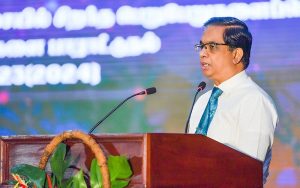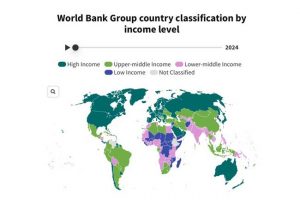Secure the land rights of food producers to overcome the food crisis
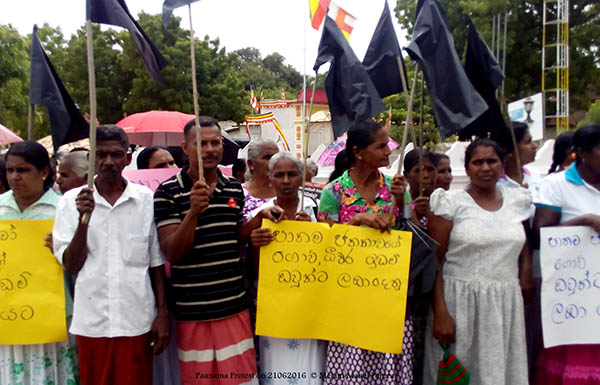
October 16 is World Food Day – This year’s Food Day was marked at a time when the people living in Sri Lanka are facing a massive food crisis, but the crisis did not happen by itself and it is also shown as a result of the government’s irresponsibility towards the people. As an immediate and important step in overcoming the food crisis, Scholars say that the land rights of food producers should be confirmed and until that is done, the food crisis as a country cannot be overcome.
Under the auspices of Prime Minister Dinesh Gunawardena and Minister of Agriculture Mahinda Amaraweera, the State function of the World Food Day was marked on Friday the Food and Agriculture Organization of the United Nations (FAO), together with the International Fund for Agricultural Development (IFAD) and the United Nations World Food Program (WFP).
This year the theme called for collective action towards “better production, better nutrition, better environment and a better life”.
 Delivering the keynote address at the event the Prime Minister, Dinesh Gunawardena pointed out that with nearly 30 to 35 per cent of the population directly or indirectly dependent on agriculture for their livelihood, Sri Lanka needed to invest deeply in modernizing and developing the agriculture sector, adding that his “government is fully committed to achieving this gigantic task. Agriculture and food security remain a national priority.”
Delivering the keynote address at the event the Prime Minister, Dinesh Gunawardena pointed out that with nearly 30 to 35 per cent of the population directly or indirectly dependent on agriculture for their livelihood, Sri Lanka needed to invest deeply in modernizing and developing the agriculture sector, adding that his “government is fully committed to achieving this gigantic task. Agriculture and food security remain a national priority.”
Also the Officer in Charge at WFP, Sri Lanka ,Gerard Rebello highlighted that urgent action was needed to safeguard the most vulnerable and marginalized communities from the impacts of the crisis.
“WFP has commenced its emergency operation to provide food and nutrition assistance to 3.4 million people. We are also continuing to work with smallholder farmers to make food systems more robust and resilient to climate-induced shocks so that food travels uninterrupted from farm to table, even during times of crises,” he said.
Although the theme of the year is named as ” better production, better nutrition, better environment and good life”, in order to “get the best of such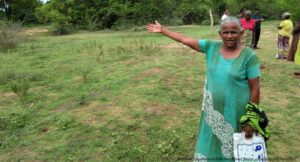 things”, the current background in the country must be completely changed, according to scholars and those engaged in food production.
things”, the current background in the country must be completely changed, according to scholars and those engaged in food production.
According to data from the Department of Population and Statistics, food inflation has risen to 90.9 percent in June 2022, and food shortages and rising prices of available food will continue further.
Sri Lanka has the ability to face this crisis and local food producers also have a big role to play. In order to fulfill that role properly, they should have their rights to their lands and farmlands confirmed.” told Mojo News Sandun Tudugala, a representative of the People’s Alliance for Right to Land (PARL) and also the Program Coordinator of the Law and Social Trust (LST).
“More than 1-5 million of the population of Sri Lanka are small-scale food producers in the country, and they are making great efforts for food safety, but it is a question whether the society as well as the governments fulfill the duty to those food producers.” he said.
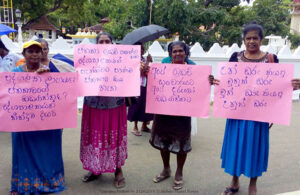 The fact that their land and natural resources, which are the most essential factors for small-scale food producers, have been taken away from them, and due to the militarization of the northern and eastern provinces for more than 30 years and even after that, the army has taken away and held the land of the farmers and the land of the Fisher community in large numbers. He pointed out that the Small Scale Fisher people have lost their jobs due to various kinds of obstacles.
The fact that their land and natural resources, which are the most essential factors for small-scale food producers, have been taken away from them, and due to the militarization of the northern and eastern provinces for more than 30 years and even after that, the army has taken away and held the land of the farmers and the land of the Fisher community in large numbers. He pointed out that the Small Scale Fisher people have lost their jobs due to various kinds of obstacles.
In addition, he said that it is a newly heard case that the lands liberated from the army in the northern and eastern provinces are once again taken from the forest conservation, wildlife conservation and archeology institutes in a very arbitrary manner.
He also mentioned that the small-scale food producers have been completely wiped out in the economic plans and development projects of the country as well as they have been completely thrown away from their own lands due to the large scale failed development projects of the government.
“Furthermore, farmers are being removed from large-scale farmlands for the development of tourism – the plantation workers, who have been contributing to the country’s economic development in food production for many generations, still do not have land rights,” he said.
“how to produce the food needed for the country if the authorities raise various issues and encroach on the lands that people have traditionally used for the production of food for the country? Sandun Tudugala raises questions?
for the production of food for the country? Sandun Tudugala raises questions?
As long as asserting the right of the land of the food producers, local farmers and Small Scale Fisher communities who produce food for the people of the country , it is “not possible to get rid of the food crisis in our country.” he pointed out.
Therefore, he emphasized that it is the main responsibility of the rest of the people living in the country to force the government, authorities to resolve the land ownership crisis faced by all food producers in Sri Lanka.
About 40 percent (1-2 million families) of Sri Lanka’s population, are engaged in agriculture or livestock production.
In the People’s Land Commission convened by the People’s Alliance for Land Rights (PARL) in 2020-2021, “loss of farmland due to militarization, acquisition of land for large-scale export-oriented cultivation, infrastructure development and tourism, urban expansion, transfer of agricultural land to private entrepreneurs and cases of forced acquisition by various ministries” have been reported by food producers in Sri Lanka.
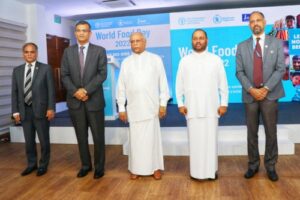 “My daughter has got selected to under 19 Sri Lankan Cricket pool. She participates in Cricket training camps. She gets food there. But when she is at home we are unable to provide with nutritional food. We find it very difficult to make both ends meet. She is afraid she will have to give up her sports.” told a person from Anuradhapura area.
“My daughter has got selected to under 19 Sri Lankan Cricket pool. She participates in Cricket training camps. She gets food there. But when she is at home we are unable to provide with nutritional food. We find it very difficult to make both ends meet. She is afraid she will have to give up her sports.” told a person from Anuradhapura area.
Also another woman from Suriyawewa area has shared with Citizens’ Dialogue Platform about her pathetic situation, “My daughter works in a hotel. Sometimes she brings leftover food home. Then only we can give her daughter a piece of fish or meat. My daughter or I don’t eat it. We give it to the child. Many employees of the hotel have lost their jobs. We are very afraid that how long my daughter will be able to secure her job.”


